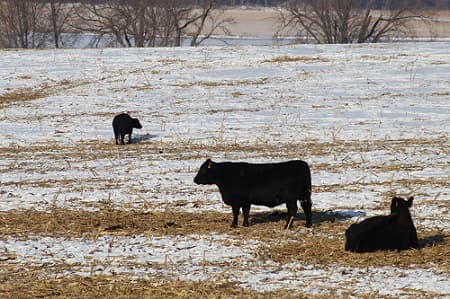Prepare Livestock for Cold Weather
Jan 27, 2021

January 22, 2021, 2:25 pm | Allyson Beninga, Grant Dewell, Chris Rademacher
AMES, Iowa – The colder temperatures of the winter season are on the way and livestock producers should make sure their animals are well cared for.
Access to clean water, ample feed and a well-maintained shelter, windbreak or facility are common requirements for all livestock during cold weather.
Chris Rademacher, extension swine veterinarian and associate director of the Iowa Pork Industry Center at Iowa State University, said the biggest thing with swine is to make sure they are warm, dry and draft-free.
This time of year is a good time to check for cracks or crevices in the doors, walls or curtains. Pigs will naturally huddle together to stay warm, but drafts can affect this behavior.
“One of the biggest objectives in modern swine housing during the winter months is to ensure that the building’s ventilation system is working properly,” said Rademacher. “In the winter season, the goal is to keep the building warm, while using the minimum amount of ventilation to exhaust the gases and excess moisture.”
Grant Dewell, extension beef veterinarian at Iowa State, said cattle are usually cold tolerant but extreme temperatures are still dangerous.
Windbreaks, extra bedding and feed are a critical strategy to ensure the cows are still maintaining a healthy body temperature. It also is beneficial to feed at a certain time of day.
Feeding cows in the late afternoon will help them get through cold overnight temperatures as rumen heat production peaks about six hours after being fed. During periods of continual cold weather cows will need approximately an extra pound of corn for every 10 degrees Fahrenheit of cold stress below 20 F.
This is also a good time to check that waterers are working correctly.
Cooler winters are sometimes favored by livestock producers, compared to volatile freeze-thaw cycles, but subzero temperatures can make for extra work, and stress on animals. Younger and thin livestock are often most susceptible, and the cold stress can cause increased issues with production, and overall animal health.
When in doubt, work with your nutritionist or veterinarian to ensure the welfare of your livestock and your operation. Additional information for cattle producers is also available in the January edition of the “Growing Beef Newsletter.”
Source/Credit: Iowa State Extension